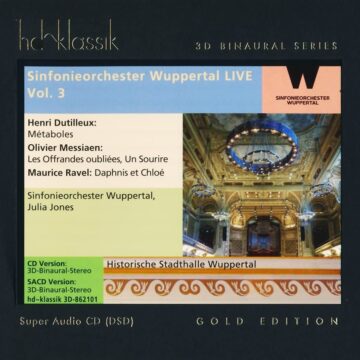British conductor Julia Jones is renowned for the crispness of her interpretations, and the sensitivity of her conducting is echoed in countless reviews. The Guardian speaks of “searing intensity” and Deutschlandradio Kultur highlights the “great lightness and clarity” of her Mozart.
Julia is a regular guest at the Royal Opera House, Covent Garden, where she has conducted Rigoletto, Così fan tutte, Die Zauberflöte, Carmen and returns this season to conduct Le nozze di Figaro. She also maintains a close relationship with Oper Frankfurt, where she has acquired renown with operas including Falstaff, Idomeneo, Die Entführung aus dem Serail, Le nozze di Figaro, Così fan tutte, La Damnation de Faust, L’Italiana in Londra and Die Zauberflöte returning this season to conduct Alcina.
Upcoming performances include returns to The Royal Danish Opera with Idomeneo, Royal Opera House, Covent Garden and The Prague National Theatre.
This biography is for information only and should not be reproduced.
Alcina
Oper Frankfurt, June 2025
“The Frankfurt Opera and Museum Orchestra, with its baroque instrumentation and approximately 30 musicians, is carefully conducted by Julia Jones. Jones is not a fan of extreme tempo shifts, high-speed climaxes or other supposed Baroque revivals. Together with the orchestra, she relies on the expressiveness and beauty inherent in the score, with a highly precise playing style. And this works extremely well, especially when accompanying the entire ensemble of singers.”
– Monika Rittershaus, Opera Online
“The sound that Julia Jones creates with the superbly arranged orchestra in the raised pit is one of noble restraint, tasteful and, despite the lack of vibrato in the strings, exemplary in its clean intonation.”
- Michael Demel, Der Opernfreund
“Handel is as modern as he can sound here, which also applies to Jones’ historically informed but decidedly contemporary conducting”
- Judith von Sternburg, Frankfurter Rundschau
“Julia Jones has transformed the opera and museum orchestra into a splendid Handel ensemble. With it, the conductor conjures up the colour palette with which the composer wrote what is perhaps his most sophisticated opera score.”
- Bernd Künzig, SWR Kultur
Otello (Verdi)
Den Norske Opera, January 2025
"Conductor Julia Jones leads a performance with power, precision, and momentum."
Eystein Sandvik, NRK
"Julia Jones conducted the Opera Orchestra with dynamic precision through Verdi’s complex score."
Hilde Halvorsrød, Scenekunst
"The British guest conductor Julia Jones leads the Norwegian National Opera & Ballet’s orchestra with an intense orchestral force."
Sören Tranberg, Tidskriften Opera
"In the orchestra pit, conductor Julia Jones exerts an unusually fine-tuned control over these vast dynamic shifts."
Hild Borchgrevink, Dagsavisen
Le nozze di Figaro
Royal Opera House, September 2024
"Julia Jones returns to conduct, with exemplary results: attentive to both balance and tempo, she and the orchestra make Mozart’s score zing along, fleshing out both its emotional highs and lows, and its sheer dramatic energy."
George Hall, The Stage
"Julia Jones conducted with authority. She kept the pace propulsive but created moments of relaxation, and she built the finales adroitly. She also allowed some decoration, appoggiaturas and the odd turn, and kept the orchestral sound bright and crisp, the brass pleasingly muted."
Francis Muzzu, Opera Now
"Julia Jones conducts with an energy that draws the maximum potential from the music"
Richard Fairman, Financial Times
"In the pit Julia Jones kept a tight rein on things, the evening whizzed by, while the orchestra played like angels for her, enhanced by the bracing valveless horns and timps hit with hard sticks to give a period flavour to the proceedings."
Keith McDonnell, MusicOMH
"The character of the performance as a whole [was] underpinned by Julia Jones’s lithe pacing, transparent orchestral textures and . . . sensible tempi"
Hugh Canning's Operalogue
"Conductor Julia Jones accompanied securely, maintaining flowing tempos and bouncing rhythms"
Nicholas Kenyon, The Telegraph
"Jones conducts with fierce energy and drive"
Tim Ashley, The Guardian
"Julia Jones offered a perceptive reading of Mozart’s late masterpiece, bringing out the color and nuance in the score"
Mahima Macchione, Operawire
Conductor Julia Jones has a vibrant and playful interpretation of the score. Her dynamics leave nothing to be desired between touching pianissimo and forceful fortissimo. Gloves off Mozart is the best kind.
Andrew Lohmann, London Unattached
"The excellence on the stage was once more matched by some fine conducting, this time from Julia Jones, and the near-perfect orchestral accompaniment from the on-form Orchestra of the Royal Opera House. Unlikely as it seems it was as though Jones and her musicians breathed new life into Mozart’s vibrant score making it the near-perfect commentary it should be on the action and the characters we watch."
Jim Pritchard, Seen and Heard International
"The joy was completed by a fine performance from the Royal Opera House orchestra, impressively conducted by Julia Jones at a good pace to keep the singers and instrumentalists perfectly together throughout."
William Hartston, Daily Express
L'italiana in Londra
Oper Frankfurt, Spring 2024
Julia Jones leads the Frankfurt Opera and Museum Orchestra . . . through the turbulent score with great feeling for subtle nuance and unerring punchlines
Markus Gründig, kulturfreak.de
Die Zauberflöte
Oper Frankfurt, February 2024
Conductor Julia Jones gives full expression to one of Mozart's most accomplished scores.
Helene Adam, Cult News
Rigoletto
Royal Opera House (October 2023)
The most compelling drama, however, comes from the pit, where the orchestra delivers much atmospheric colour and detail, as well as energy and rhythmic tautness. Clearly the conductor, Julia Jones — who is British but has made her career largely in Germany — is on galvanising form.
Richard Morrison, The Times
Julia Jones's conducting is pure perfection; her interpretation of the score brings out the best in the Orchestra of the Royal Opera House.
Michael Higgs, Broadway World
Conducting Verdi for the first time at Covent Garden, Julia Jones was sure-footed in tempi and phrasing, allowing the music to move the action along in a way that felt completely natural, never rushed nor dragging.
David Karlin, Bachtrack
The orchestra was conducted excellently by Julia Jones, whose energy showed itself most impressively in the final act when the power displayed by the orchestra perfectly matched the increasing tension of the action and the glory of Verdi's music.
Hartston William, Daily Express
The conductor Julia Jones partners her singers with sensitivity, achieving just the right balance; the magnificent orchestra emerges supportive yet never overwhelming. Hers is a spacious reading that gives the voices room to breathe and shine.
Jessica Duchen, iNews
Her dramatic use of dynamics showcases Verdi’s masterful score, from the lovely cello and oboe duet in the third act to the battering brass that opens and closes the night. Jones keeps the tempo moving, leaving no room for stagnation onstage.
Grace Richardson, London Unattached
Arturo Pizzaro; Wuppertal Symphony Orchestra, Beethoven ‘The 5 Piano Concertos, Odradek Records
May 2023
"Julia Jones is a strong, impulse-driven leader of the Wuppertal Symphony Orchestra who play courageously . . . Under her direction, the players are feisty, gripping, fresh, and full of imagination. A success."
Dirk Schauss, Online Merker (The international cultural platform)
“At his side was the Wuppertal Symphony Orchestra, which under the direction of Julia Jones (General Music Director of the orchestra) reached new heights. The orchestra plays with freshness and verve, which suits Pizarro’s playing perfectly . . . Altogether, this is an all-around successful recording of the complete Beethoven Piano Concertos characterized by freshness and brilliance.”
Carsten Dürer, Piano News
Ernani, Verdi
De Vlaamse Opera (November 2022 – January 2023)
“The direction of the English conductor Julia Jones, who has already approached Verdi more than once over the course of her already long career, proves honest and efficient; her baton is certainly attentive to the details and contrasts of the score”
Benedict Hévry, Res Musica
“While having a good experience of the composer’s work she masterfully conducts the Flanders Opera Symphony Orchestra.”
Camillo Faverzani, Premiere Loge
“On the other hand, conductor Julia Jones can handle the boastfulness of the score. She bends pathos into strength, menacing sentiment into poetry.”
Stephen Moens, DeMorgen
“Amidst all that visual splendour, Verdi's music remains wonderfully intact. Thanks to conductor Julia Jones. She has an excellent feel for Verdi's music and smoothly leads the orchestra through the score. Ernani is the expression of a warm glow. Jones does not look for fanfare, but strives for a soft, smooth sound. That interpretation is a relief.”
Els Van Steenberghe, Knack Focus.com
Così fan tutte
Royal Opera House (July 2022)
“Solid ensemble performance, thoughtfully conducted by Julia Jones.” – The Times, Rebecca Franks
“Julia Jones’s buoyant conducting, mostly perfect in choice of fleet but not rushed tempi, seemed well tuned to her singers.” David Rice, The Arts Desk
"conducting by Julia Jones was trditionl, but swelled in emotion in all the right sections, heightening the cast's palpable chemistry." - Tacita Quinn, London Unattached
Haydn’s Symphony No. 44 and Mozart’s Requiem
Royal Danish Orchestra (February 2022)
"With an initially delicate grip on the orchestra , Jones swiftly moved right into the core of the symphony with increasing intensity and authority, leading the Royal Danish Orchestra to its climax in the Adagio and the subsequent Presto finale. (...) The Requiem was delightful under Jones' leadership."
Knud Arne Jürgensen, XQ28.com
"The Royal Danish Orchestra's playing was less overcomplicated with a delicate non-vibrato sound in the strings and an introverted wind section - clearly a conscious decision by conductor Julia Jones who really knows her Mozart."
Lars Ole Bonde, Operamagasinet Ascolta
These photos are available to be downloaded.
Right click on a desired image and select the "Save Link As" option.



